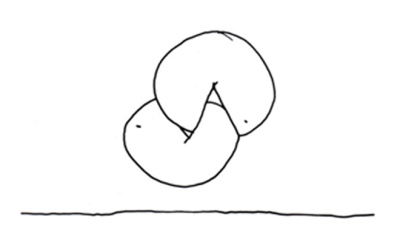
The Magic Formula of 4-2
There is a formula for personal success that is as close to magic as anything I know for curing some of the most hurtful diseases that afflict us humans. The diseases I’m speaking about are those that infect and weaken our ability to discern reality, create great relationships, and stay sane when the world is un-sane. I summarize the formula using the magic numbers “4-2.”
4-2 is shorthand for two little words—for and to. These two small words have great and far reaching impact on our lives as they summarize and convey some of the most important concepts in human experience. The distinction that I’m going after here has to do with our human responses and so with our response-abilities. It is here that 4-2 provides a quick way to recognize the difference between what we are responsible for and who we are responsible to. Doing this creates a powerfully enhancing way to navigate relationships when they can seem more like confusing webs.
It All Begins with Responses
The 4-2 formula relate to the way we can respond to things. And in this, whatever happens, we can always respond. We can respond with our mind by thinking about it, representing it, relating it to other things, pondering it, creating ideas and beliefs about it, making decisions, setting frames and understandings about it. All of this relates to the most internal world of our thoughts. And in this private domain, no one can make you think anything. They can trigger your thoughts, they can invite you to think in a certain way, but in the end, your thoughts are your thoughts.
Further, whatever you think about a thing creates and governs your feelings about it. Your feelings, emotions, and moods are also responses. They describe your emotional responses to things. So whatever happens, you respond to it at the emotional level. You feel. And generally, as you think about it, so you will feel. This creates energy, somatic energy, in your body so that you can do something about your thoughts. And while we sometimes in stress regress to a more primitive state and say, “You make me angry” or afraid, or jealous, or happy, or whatever. The truth is that your emotions like your thoughts are your emotions.
Those are your two private powers. And from those responses you have two public powers. You can respond with speech and behavior. These are your linguistic and behavioral powers by which you can influence the world and actually do something as part of your response. And again, whatever you say, whatever linguistic skills and competencies you develop and use as part of your response—it is your response. Your power.
First we go for the For (4)
With all of these personal powers for responding to the things that happen in life, there is another critical distinction. Not only is there the distinction between private and public, there is the distinction between what you are response-able for and to. The first speaks about what you can do that comes from out of your area of control and t he second speaks about how you use those responses as you give them to various people.
What are you are responsible for? I’m sure the answer is obvious. I am responsible for the responses that I can make. You are responsible for your mental responses (your thoughts), your emotional responses (your feelings), your verbal and behavioral responses (what you say and do). And all of this responsibility for describes accountability. You are accountable for what you do, for your actions, your behaviors, and for all of your responses. If you are not responsible for these things, then who is? This is your area of control.
So imagine yourself inside a sphere—a bubble of energy that extends throughout to your personal sense of space, perhaps the length of your arm (and so a yard or meter out and all around you). This is your area of accountability. Let’s think of it as your response zone, or your power zone. Within it arise your thoughts, feelings, words, and actions. You generate these from within and so they arise and come from out of you. Nobody outside the circle can be responsible for these responses, they are ours.
Moving on out to the To (2)
The tiny little word to describes relationships. By your public powers of speech and behavior you relate to people, groups, teams, organizations, etc. and so when you are responsible to someone or a group, this creates the familial, friendship, cultural, career, government, and so on. These are the systems that you live in and the persons, groups, and communities to whom you answer. If you imagine an arrow that moves out from the circle of your power zone to others in a larger circle of loved ones, colleagues, friends, etc., that arrow identifies who you are responsible to.
Our for gives us our what—the content of what we think and feel and then outwardly say and do. The to gives us the context of the persons with whom we offer these personal responses.
And Now for the Line
Let’s now draw a line to separate and distinguish relationship (responsibility to) and accountability (responsibility for). We draw this line so that we can distinguish two kinds of responses that we make. First we identify a response for whatever it is that we are thinking, feeling, saying, and doing, and then we identify to whom we are making this response.
The sanity rule here is simple to understand but very difficult to put into action. It is this:
You are only response-able for the responses that you generate mentally, emotionally, verbally, and behaviorally. Your ability to respond (responsibility) ends at your nose or the edge of the reach of your arm. You cannot be responsible for much that goes on beyond this line.
Similarly, when you set the frame that you have lots of relationships that set up various accountabilities and inter-relational dynamics, then you realize that there are numerous people, situations, and groups to whom you live in a responsible relationship.
The first distinction (responsibility for) enables you to play the inner game of personal power. Highlighting your four powers (thinking, emoting, speaking, and behaving) defines what I like call your “power zone.” Focusing on and developing these functions within this zone empowers you; focusing on things outside this zone dis-empowers you.
The second distinction of responsibility to focuses your attention on the exchanges you negotiate with others as you step into and out of relationships. In your interactions with others, what you give and receive are the external responses of speech and behavior. It is what you say and how you say it with your actions that you use to negotiate with. When you negotiate, you ask that another person speaks and behaves to you in certain ways. Making these distinctions clarifies roles and relationships and so enhances sanity, that is, a good adjustment to social and inter-personal reality. This thereby reduces stress. It enables you to navigate the waters of inter-dependency with others and to avoid the shoals of co-dependency.
So the central rule for winning this inner game that will empower you personally and enable you to know precisely where your control ends and your influence begins is the following. When you focus on your power zone, you empower yourself. And conversely, when you focus outside of this zone, you dis-empower yourself. It is that simple; it is that profound.
Being independent enables you to know and own your own response-abilities, assume complete responsibility for yourself, and assume responsibility to others. When you are independent you can easily share your independence with another because you recognize and accept that relationships are conditional.
Relationship as Responsibility To Another
Responsibility to creates and defines our interactions and relationships. If I am responsible to you, then my relationship with you is defined in terms of those responses that I give to you. The responses that I promise, or that are understood as belonging to the relationship, defines the relationship.
If I ask a friend what he would like from me, he might say that he wants me to meet him for a jog by the river trail. So we agree upon a time and place. When I come through by responsibly acting in a way so that I give him what he asked for and what I said I would do, I have been responsible. I have been responsible to him for what we agreed upon. When I do not do what I said, then I don’t come through, on my promises. I have not been responsible. Now I need to make it right by communicating or apologizing or in some way showing that I care that I disappointed him and acknowledge how it has negatively affect our relationship.
Every relationship can be understood, defined, and even analyzed in terms of the actions we promise to give to each other.
- How would you like for me to talk to you?
- What tone or volume would you like me to use when I’m upset?
- What would you like for us to do together as a couple?
- What counts for you as an enjoyable evening out?
- What counts for you in the giving and receiving of affection?
Relationships emerge from these sets of actions that we give to and receive from each other. In the best of healthy relationships we joyfully accept that we are responsible to each other. We’re thrilled to respond to each other.
All relationships operate in this way. Even business relationships involve a set of actions that we have said that we will give to our employer to get the things that we want (employment, pay, benefits, opportunities, etc.). This is the giving and receiving dimension of a relationship.
Now the inside dimension of our responses are our thoughts and feelings. What we think and feel is what makes us responsive or not-responsive to the other person. This area of attitude, disposition, mood, beliefs, and so on are the things that give the relating a certain feeling. In healthy relationships we are responsive, caring, respective, supportive, open, vulnerable, etc. Frequently we find ourselves feeling these emotions, but unskilled or unable to translate these responses into behaviors that effectively transmit them. This is where we relate to our loved one by asking them what counts and even inviting them to coach us into how to behave in ways that count for love.
Relationships, as composed of the sets of interactions, give us a hands-on understanding of what we are specifically giving and receiving from each other. The verb at the heart of relationship is relating. In relating we respond to another, we give to and we receive from the other which enables us to ask:
- How are we relating to the other?
- In what are we relating?
So the two small words “to” and “for” give us two very different concepts that are critically involved in understanding relationships. Our to and for responses identify accountability and then relationship. Both emerge from our responses and yet both create very different experiences.
Summary of the 4-2 Formula
Knowing what you are responsible for is a great step to sanity, to clarity, and to effectiveness. And knowing the persons with whom you relate is another critical point for personal success so that you can clearly define what responses you are responsible to give to them. Then you can determine if you have a healthy or unhealthy relationship or an inter-dependent one or a co-dependent one. These distinctions are also one of the unique offerings of Neuro-Semantic trainings and the coaching that Meta-Coaches do. It is just one aspect of unleashing potentials so that people can step up and actualize their highest and best.







